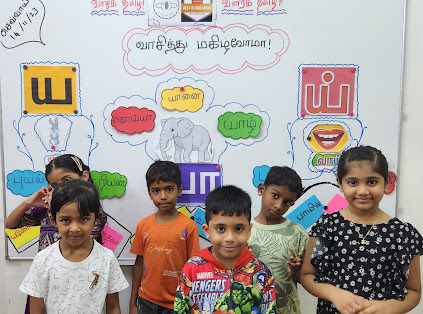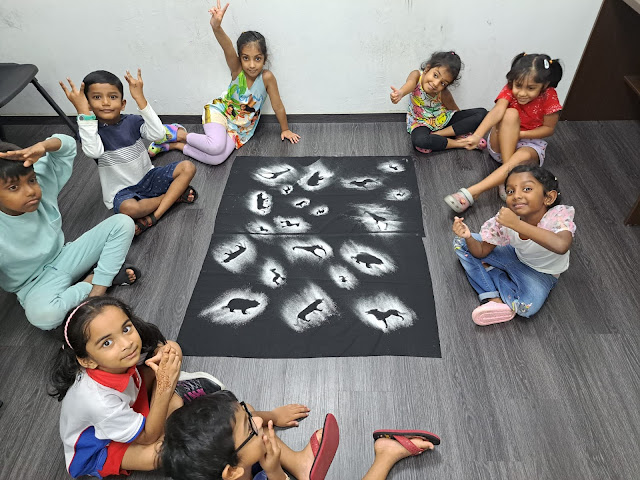Practical tips for Primary 1 Readiness for Kindergarten students.
As parents, nurturing a child's language development is an integral part of preparing them for the exciting journey of formal education. As we look ahead to the transition to Primary 1, there is a distinct focus on foundational language skills. This comprehensive guide delves into specific aspects crucial for Primary 1 readiness. By incorporating these tailored language activities into your child's routine, you are not only ensuring their linguistic preparedness for Primary 1 but also instilling a love for language that will accompany them throughout their educational journey.
1. Mastering Alphabet Recognition: Developing proficiency in recognizing the alphabet is a crucial step in language acquisition. Engage your child in letter recognition games that transform the learning process into an enjoyable activity. Through games, children not only identify letters but also associate them with memorable experiences, cultivating a positive attitude towards learning. Additionally, hands-on activities like crafting each letter add a creative dimension, providing a visual and tactile connection to further reinforce alphabet recognition. These interactive approaches lay a robust foundation for letter mastery, a key component of Primary 1 readiness.
2. Word Adventures for Language Enrichment: Embarking on word-building adventures adds an exciting dimension to language development. Utilize letter tiles or flashcards to create and explore new words together. These word-building game
is not only expand your child's vocabulary but also foster curiosity and creativity. Word hunts, where children identify words in their surroundings, provide a practical application of their growing vocabulary. This dynamic approach to language enrichment goes beyond conventional methods, instilling a love for words and preparing your child for the diverse linguistic challenges in Primary 1.
3. Reading Simple Sentences with Confidence: Reading simple sentences is a significant milestone in language development. Foster this skill by engaging in joint reading activities, allowing your child to gradually build confidence in decoding sentences. Explore various children's books together, emphasizing word recognition and sentence structure. Encourage your child to actively participate in sentence-building activities, reinforcing their ability to read aloud with ease. These practices cultivate fluency and comprehension, essential components for a seamless transition to reading in Primary 1.
4. Navigating Basic Comprehension Challenges: Navigating basic comprehension is a critical skill that paves the way for a deeper understanding of written material. After reading a short story together, prompt your child to retell it in their own words. Pose simple questions related to the story to gauge their comprehension. These activities not only enhance reading skills but also foster analytical thinking and interpretation, essential for success in Primary 1 comprehension exercises.
5. Learning through Playful Exploration: Infuse learning with playfulness to make language development an enjoyable experience. Rhyming games provide a fun way to identify and create words, promoting a playful approach to language. Story puppets add a creative element, allowing children to act out and understand narratives. These activities seamlessly integrate learning and play, contributing to a positive and engaging language learning environment as your child approaches Primary 1.
6. Flashcards for Word Recognition Mastery: Utilize flashcards as a valuable tool for mastering word recognition. Flashcard drills with words of increasing complexity aid in reinforcing visual memory and quick recall. Memory games that involve matching word pairs enhance both recognition and retention. These activities create a dynamic and interactive approach to word recognition, ensuring that your child enters Primary 1 with a strong foundation in reading and identifying words.
7. Enriching Vocabulary: Elevate your child's vocabulary by introducing a new word each day. Incorporate these words into daily conversations, helping your child understand their usage in context. Create a simple picture dictionary that showcases commonly encountered words in stories. This approach not only broadens their vocabulary but also encourages the application of these words in various contexts, preparing them for the vocabulary demands of Primary 1.
8. Reading Aloud for Fluency: Developing fluency in reading is a key aspect of language readiness for Primary 1. Establish a family reading time routine where everyone reads aloud. This communal reading experience not only enhances fluency but also provides an opportunity for shared learning. Encourage expressive reading, prompting your child to infuse emotions and intonation into their reading. This practice instills a sense of confidence and comfort with reading aloud, ensuring a smooth transition to Primary 1's emphasis on oral reading skills.
9. Building Sentences with Magnet Words: Transform sentence-building into an interactive and tactile experience using word magnets on a magnetic board. This hands-on approach not only reinforces sentence structure but also allows for creative exploration. Introduce sentence puzzles as an engaging activity that combines problem-solving with language development. These activities contribute to a comprehensive understanding of sentence construction, a skill vital for success in Primary 1 language studies.
10. Sequencing Stories for Comprehension: Developing story sequencing skills enhances comprehension and analytical thinking. Utilize sequencing cards to help your child arrange the events of a story in chronological order. Drawing stories provides an artistic outlet for children to visually represent different parts of a narrative. These activities not only reinforce comprehension but also encourage creativity and critical thinking, preparing your child for the narrative elements emphasized in Primary 1 language studies.
These engaging and interactive exercises make the language learning journey enjoyable and memorable, setting the stage for a successful transition to Primary 1. Happy learning!
Visit our website for more information:
#Primary1readiness
#Besttamituition
#Tamilclass
#Sgtamiltuition







Comments
Post a Comment